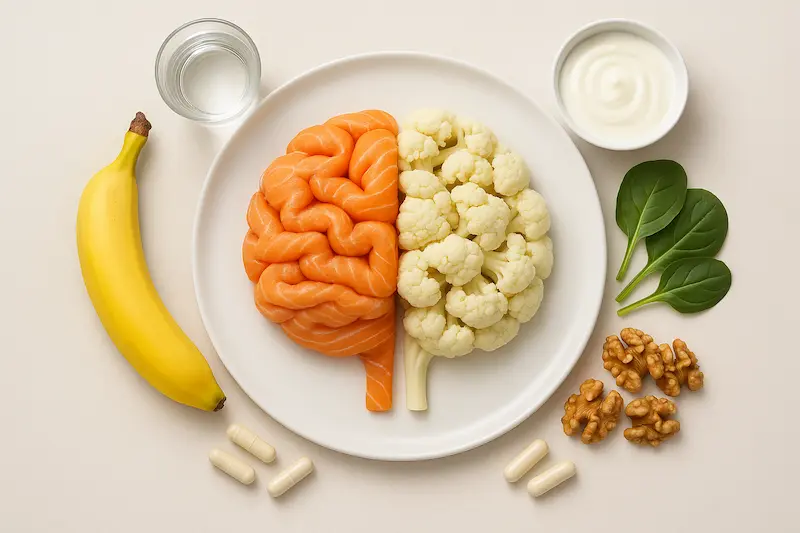🧠 Can’t Think Straight After Lunch? Welcome to the Club.
You eat a meal. Ten minutes later, your brain turns into mashed potatoes. You forget words, lose track of conversations, and wonder if you’re having a slow-motion allergic reaction to your own life.
If that sounds familiar, you’re not broken — but your gut might be waving a very polite red flag.
🦠 What Is the Gut-Brain Connection?
The gut-brain axis is your body’s internal gossip line. It links your digestive system with your brain through nerves, hormones, and your microbiome.
When your gut isn’t happy — inflammation, poor digestion, imbalances — your brain gets caught in the crossfire. This can show up as:
- Mental fog
- Trouble focusing
- Word retrieval issues
- That “off” feeling you can’t quite explain
Fun fact: about 90% of serotonin (your happy brain chemical) is made in your gut. So yeah, your belly kind of runs the show.
⚠️ Why Your Gut Might Be Fogging Up Your Brain
Let’s walk through a few common digestive culprits behind post-meal fog:
1. Food Sensitivities
You might be reacting to certain foods — not with hives or drama, just low-grade inflammation that fogs your focus. Gluten, dairy, soy, eggs, and corn are common suspects.
This time we’re sending all our subscribers our “Sneaky Food Reactions” guide — a simple cheat sheet to start spotting patterns.
2. Poor Digestion
If your stomach acid is low or your enzymes aren’t pulling their weight, food lingers too long and creates digestive traffic jams. Your body spends so much energy sorting that out, your brain checks out.
3. Leaky Gut
When your intestinal lining gets a little too “open-door policy,” it can let unwanted stuff into your bloodstream — including things that can affect your brain chemistry.
4. Blood Sugar Crashes
That pasta may spike your blood sugar — then drop it like it’s hot. Cue: mental crash, shaky hands, mood swings, and the desperate urge to lie down under your desk.
5. Microbiome Mayhem
An unbalanced gut microbiome (too many bad guys, not enough good ones) can mess with everything — digestion, inflammation, and mental clarity included.
🕵️♀️ What You Can Do (Without Panic)
Brain fog doesn’t mean you’re destined to live in a mental haze forever. A few small changes can make a big difference:
Step 1: Track Your Symptoms
Start noting what you eat and how you feel afterward.
- Is the fog worse after breakfast?
- Does it hit harder with dairy?
- Are carbs your frenemy?
Even a few days of tracking can reveal patterns. You don’t need to become a spreadsheet wizard — just jot it down somewhere.
Step 2: Simplify Your Meals
Try meals with fewer ingredients and less processing. Focus on whole foods. Chew your food properly (yes, like your mom told you). Take your time eating — your gut prefers chill.
Step 3: Support Digestion Naturally
Things that may help:
- Eating in a relaxed state (no doomscrolling)
- Light walks after meals
- Drinking enough water (but not chugging it with meals)
- Mindful chewing (seriously, it matters)
🤔 Final Thought: Listen to Your Gut. Literally.
If your brain short-circuits after eating, it’s not in your head — it’s in your belly.
You don’t need to overhaul your entire life. You just need to start noticing. Your gut is trying to tell you something… maybe it’s time to listen before it sends another brain-fog memo.
This time we’re sending all our subscribers our “Sneaky Food Reactions” guide. It’s a quick, printable list of common food triggers and subtle signs to watch for. If your fork is sabotaging your focus, this might help you catch it in the act.

Alex Keane is a health writer and gut health researcher with a personal mission: help people stop feeling like garbage for no clear reason. After years of dealing with brain fog, digestive issues, and 3am anxiety spirals, Alex started digging into the connection between the gut and the mind — and never looked back.
When not writing about microbiomes, Alex is usually found experimenting with fermented foods, walking obsessively, or trying not to buy more supplements off Instagram.
Alex is not a doctor, and that’s probably for the best.

